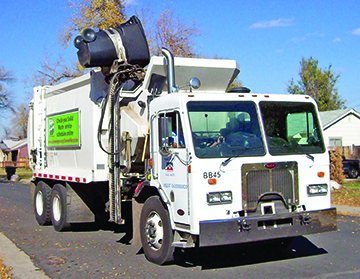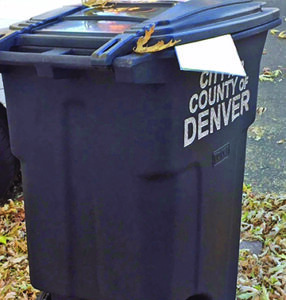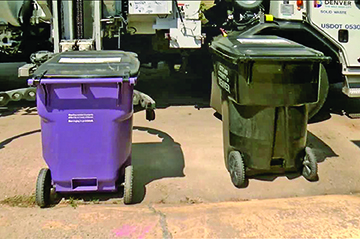by Mark Smiley
 The city’s plans for residential trash, recycling, and compost services still lack strategy and responsiveness to residents, according to the recent follow-up report from Denver Auditor Timothy O’Brien.
The city’s plans for residential trash, recycling, and compost services still lack strategy and responsiveness to residents, according to the recent follow-up report from Denver Auditor Timothy O’Brien.
“We’ve continued to hear from a lot of residents in the past 18 months who have concerns about their trash and recycling pickup, as well as the implementation of composting services,” Auditor O’Brien said. “There’s still work to do to achieve ideals of efficient pickups and environmental benefit.”
The auditor looked at the city’s residential trash, recycling, and compost services ahead of the implementation of the volume-based pricing program in November 2022. They found understaffing, old and unreliable trucks, and lack of strategy for the new program.
The auditor made nine recommendations in the original audit. But during the follow-up work they found the division fully implemented only three of them. Five other recommendations that addressed significant risks were not implemented. And one recommendation related to replacing the city’s aging trucks was partially implemented.
The remaining risks center on strategy, data, and resident satisfaction.
More than 18 months into the volume-based pricing program — which shifts the cost of weekly trash pickup to residents based on how much they throw away but make s recycling and compost included at no extra charge — the Solid Waste Management Division still lacks a strategic plan that identifies specific objectives, goals, and needs for delivering services to residents.
s recycling and compost included at no extra charge — the Solid Waste Management Division still lacks a strategic plan that identifies specific objectives, goals, and needs for delivering services to residents.
Managers said plans to develop a strategic plan are ongoing. Division leaders acknowledged the importance of a comprehensive strategy, but still do not have one to guide their day-to-day operations or set long-term goals.
Additionally, key recommendations still need work for tracking data for efficient routes and responsiveness to resident service requests.
The city’s new routing software is intended to collect data like maps of pickup points and monitoring of stops. But the system was neither fully operational at the time of follow-up, nor was the software referenced in the draft procedure on how to adjust collection routes.
And although the division has a dashboard to track operations and metrics like tonnage and route completion, there are still inconsistencies in how it tracks open and closed cases from residents who report missed pickups through 3-1-1 and other platforms. As a result, the division does not have an accurate picture of its response to residents’ service requests.
Similarly, the auditor recommended the division develop a process for annual performance reviews of trash, recycling, and compost services. The department has not yet finalized its review process or created an annual review, nor does it plan to pursue feedback on resident satisfaction through surveys or an analysis of environmental costs.
“The trash, recycling, and compost program is one that impacts almost every person who lives in Denver,” Auditor O’Brien said. “I would like to see more improvement on behalf of the people we serve.”
Without sound data and information, the Solid Waste Management Division cannot make informed decisions that impact the viability of the city’s volume-based pricing program and cannot ensure the fees it collects for residents’ trash pickup will achieve the city’s goal to increase Denver’s waste diversion rate.
One area where the divis ion did take some action is addressing its aging fleet of trucks. At the time of the audit, nearly half of the vehicles in the division’s fleet were within a couple of years of the end of their estimated remaining life. The average estimated useful life for waste collection trucks is eight years, but the city was still using one truck that was 18 years old.
ion did take some action is addressing its aging fleet of trucks. At the time of the audit, nearly half of the vehicles in the division’s fleet were within a couple of years of the end of their estimated remaining life. The average estimated useful life for waste collection trucks is eight years, but the city was still using one truck that was 18 years old.
Since then, staff have worked on options for purchasing or leasing trucks, including plans to lease 25 new trucks every two years. However, they have not actually started leasing new vehicles. Division leaders still do not know if they will be able to replace the fleet due to backlogs and budget cuts.
“Denver’s trucks are old and cost more and more to maintain,” Auditor O’Brien said. “I’m glad to see a plan for replacement, but waiting longer due to budget constraints will likely drain even more of the city’s budget.”
The division did take action to address some of the staffing concerns we identified. In 2022, there was a 21% vacancy rate among drivers. Since then, the division performed a staffing analysis. As of May 2024, staff said 84% of positions are filled.
